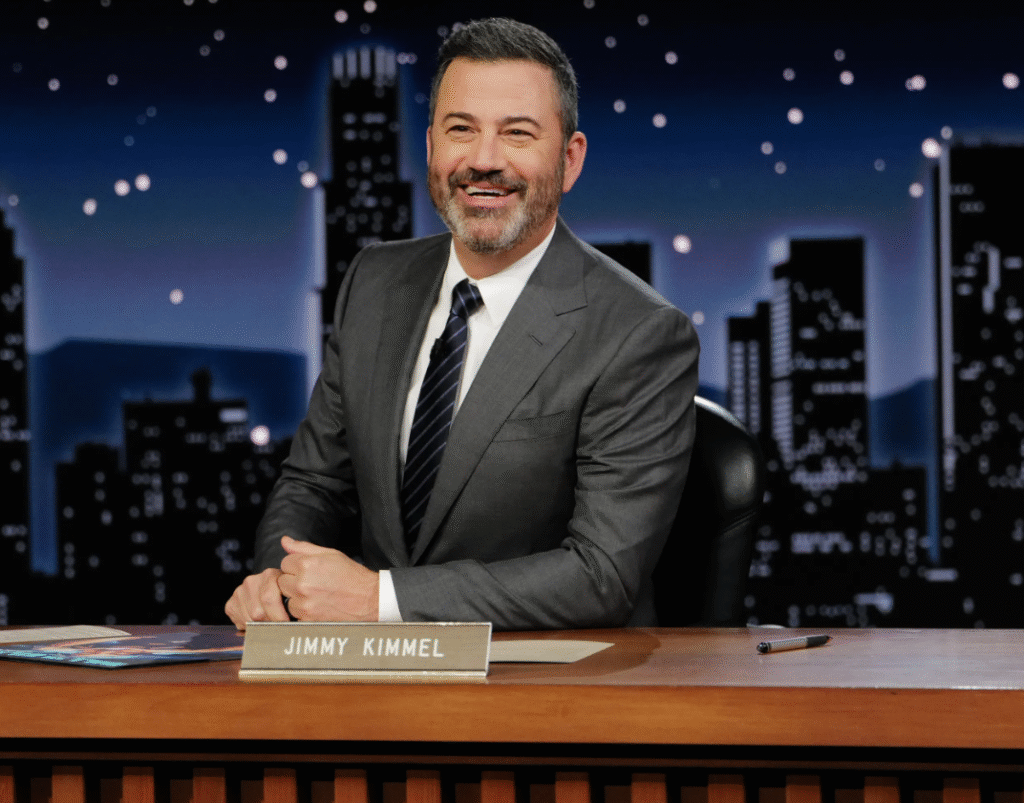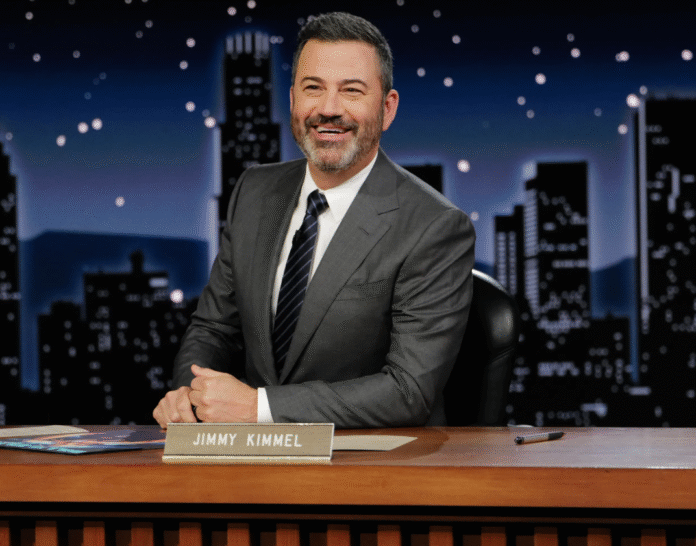Jimmy Kimmel Free Speech Battle: Why His Comeback Matters
The Jimmy Kimmel free speech controversy has become one of the most heated debates in American television today. After a brief suspension, the late-night host returned to his ABC show with a tearful monologue, fiercely defending his right to speak freely while criticizing political and regulatory figures he accused of suppressing dissent.
His emotional comeback not only addressed the fallout from his earlier remarks about the killing of conservative activist Charlie Kirk but also reignited national conversations on media censorship, politics, and the boundaries of comedy.

The Suspension That Sparked the Jimmy Kimmel Free Speech Debate
Earlier this month, Jimmy Kimmel Live! was temporarily pulled from the air after Kimmel commented on Kirk’s murder. His critics, including the head of the Federal Communications Commission (FCC), Brendan Carr, accused him of misleading the public and using tragedy for political points.
Supporters, however, argued that comedians have long been cultural commentators and that Kimmel’s suspension represented a dangerous step toward silencing dissent.
Jimmy Kimmel Free Speech: The Tearful Comeback
On his first show back, Kimmel appeared emotional, admitting that his words may have felt ill-timed to some but insisting that he never intended to trivialize the murder of a young man. He praised Erika Kirk, the widow of Charlie Kirk, for showing grace by forgiving her husband’s alleged killer, calling her response “deeply moving.”
Kimmel went on to accuse the FCC and its leadership of “mob tactics” against him and criticized Donald Trump for celebrating his suspension.
Trump’s Reaction and the Political Fallout
Donald Trump openly welcomed Kimmel’s suspension, later blasting Disney and ABC for reinstating him. The former president wrote on his social platform that ABC “gave Jimmy Kimmel his job back” and mocked the comedian’s ratings, calling him talentless.
Kimmel responded on air, describing Trump’s calls for late-night hosts to be fired as “un-American” and “dangerous,” reinforcing that the Jimmy Kimmel free speech issue was bigger than comedy, it was about democracy itself.
Jimmy Kimmel Free Speech and the Role of the FCC
The FCC, led by Brendan Carr, played a central role in the controversy. Carr, once a free speech advocate, called for Kimmel’s suspension after his controversial broadcast. Kimmel accused Carr of hypocrisy, and in a comedic twist, actor Robert De Niro appeared in a skit portraying Carr, quipping, “Speech, it ain’t free no more.”
The FCC’s involvement raised broader concerns. Should regulators have the power to silence comedians, or is that government overreach? This remains one of the key questions in the Jimmy Kimmel free speech debate.
ABC Affiliates Push Back
Even after Disney reinstated the show, not all viewers could tune in. Major broadcasting groups like Nexstar and Sinclair, who collectively operate more than 20% of ABC’s local stations, refused to air Kimmel’s comeback episode. Instead, they replaced it with alternative programming.
Nexstar stated it would not broadcast the show until it received assurances of “respectful, constructive dialogue”, highlighting how corporate interests also influence what the public can see.
Celebrity and Political Support for Jimmy Kimmel Free Speech
Kimmel’s return drew strong reactions across the entertainment and political worlds.
-
Celebrity backing: Ben Stiller praised the monologue as “brilliant,” while Jon Stewart, Seth Meyers, and Stephen Colbert stood in solidarity.
-
Unexpected allies: Even Republican Senator Ted Cruz criticized the FCC’s actions, comparing Carr’s approach to a mafia boss.
-
Joe Rogan’s support: The popular podcaster said government interference in comedy sets a dangerous precedent.
The bipartisan support showcased how the Jimmy Kimmel free speech issue resonated beyond partisan divides.
Free Speech, Comedy, and American Culture
Comedy has historically been a mirror to society, poking fun at politicians, institutions, and cultural norms. From George Carlin to Jon Stewart, comedians have played a vital role in testing the boundaries of free expression.
Kimmel’s case highlights the tension between corporate, political, and public expectations of what late-night comedy should be. The Jimmy Kimmel free speech debate shows that the role of comedians as truth-tellers remains under threat.

What the Jimmy Kimmel Free Speech Battle Means for the Future
The controversy isn’t just about Kimmel. It’s about whether entertainers can challenge those in power without fear of censorship. With increasing political polarization and corporate influence, cases like this may shape how much freedom public figures truly have.
For Kimmel, the battle appears far from over. While reinstated, his show remains blacked out in several regions, and critics continue to pressure ABC. Yet his return sent a strong message: he won’t be silenced.
Conclusion: Free Speech on the Line
The Jimmy Kimmel free speech saga is a reminder that free expression in America is both celebrated and contested. Kimmel’s emotional comeback underlines the importance of protecting voices, even those we may disagree with.
Whether you see him as a courageous advocate or a reckless provocateur, one fact is clear: the debate around Jimmy Kimmel and free speech is far from over.

